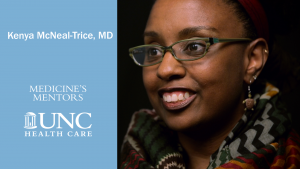At UNC Health Care, we understand that our achievements — as individuals and as a healthcare system — would be impossible without the people who challenged, helped, and encouraged us along the way. In Medicine’s Mentors, our new video series, UNC Health Care professionals and medical students share stories of those who helped shape them and discuss what makes mentorship at UNC Health Care unique. Here, Kenya McNeal-Trice, MD, opens up about her mentors from Mississippi to Spelman College to Wayne State University to UNC.

At UNC Health Care, we understand that our achievements — as individuals and as a healthcare system — would be impossible without the people who challenged, helped, and encouraged us along the way. In Medicine’s Mentors, our new video series, UNC Health Care professionals and medical students share stories of those who helped shape them and discuss what makes mentorship at UNC Health Care unique. Here, Kenya McNeal-Trice, MD, opens up about her mentors from Mississippi to Spelman College to Wayne State University to UNC.

Our first Medicine’s Mentors feature is Dr. Kenya McNeal-Trice, associate professor of pediatrics at UNC and director of the Pediatrics Residency Program. Dr. McNeal-Trice received a BS in Biology from Spelman College before entering medical school at Wayne State University. She completed pediatric residency training at UNC and then was Pediatric Chief Resident at WakeMed. In 2007, Dr. McNeal-Trice returned to Chapel Hill to take on a leadership role in medical student education as a member of the Division of General Pediatrics and Adolescent Medicine. In 2010, she assumed the role of Director of Medical Student Education in Pediatrics.
As a student educator, Dr. McNeal-Trice is an innovator, creating the nationally recognized and award-winning Transition to Pediatrics Internship course; an outstanding teacher, receiving the The Hyman L. Battle Distinguished Excellence in Teaching Award in the Clinical Sciences from the UNC SOM Class of 2013; and a tremendous student advocate, serving in the Larry Keith Advisory College. Her clinical work has focused on inpatient pediatrics and child maltreatment.
Dr. McNeal-Trice notes that throughout her educational and professional careers, countless individuals have made critical investments in her development: her mom, her high school chemistry teacher, her Spelman College and Wayne State University medical school professors, and her UNC School of Medicine Department of Pediatrics colleagues, among many others.
Watch Dr. McNeal-Trice’s video above and read several additional quotes below to learn more about the role mentorship has played in her professional development — and what makes mentorship at UNC Health Care unique.
McNeal-Trice on the investments her family made
“We moved to different towns and to different parts of town and lived in smaller apartments or smaller homes to be near better schools. We sacrificed financially so that I could attend special programs. This really paved the way for me valuing education and going to college. I think a lot of people would see these as sacrifices. I see them now as investments — which have invaluable returns not only for yourself but in how you help people around you.”
McNeal-Trice on Cheryl Goodman, her AP high school chemistry teacher
“I remember letting Ms. Goodman know that I didn’t have the money to pay for the AP test, but that I thought it was okay. For her that was just unacceptable. She actually paid for the test for me. I was amazed that someone would make that investment for me — someone that’s not a relative, someone that’s a teacher. I took the test, did very well, and my family was able to pay her back. My mom was so moved that a teacher at school would do that for me. I’ll never forget her for that. It inspired me to be that type of person, that type of teacher.”
McNeal-Trice on Dr. Jann Primus, biochemistry professor at Spelman College
“She held us to a standard of excellence and didn’t accept anything less. All of our tests were written — there was no multiple choice — because she wanted to make sure that we truly knew the foundation of science. It was inspiring to see someone that passionate about her work who made sure her students understood the material. It really helped prepare me for the early classes in medical school because my foundation was so strong. In medical school, I’d sit in classes and say to myself, ‘I know this — Dr. Primus taught us.’”
McNeal-Trice on Dr. Yvonne Friday, chief of General Pediatrics and Adolescent Medicine at Children’s Hospital of Michigan and director of Undergraduate Medical Education at Wayne State University School of Medicine
“I had never seen someone so passionate about their work. She invited us to work with her at the juvenile detention center because she believed those children deserved the same level of health care as other children in Detroit. Her energy was infectious. She made me excited about pediatrics. She demonstrated such passion and enthusiasm. Even if her students didn’t go into pediatrics, she taught them how important the care of children is.”
McNeal Trice on Dr. Wanda Whitten-Shurney, director of the Newborn Sickle Cell Screening Program at Children’s Hospital of Michigan and assistant clinical professor of Pediatrics at Wayne State University School of Medicine
“There is a very complex population of patients in the Detroit area with sickle cell disease, and the way she connected with her patients struck me. She knew everything about them from a clinical standpoint and a social standpoint. I was inspired by the way she advocated for them in the clinic. She was a fireball in how she made sure those children and families received the best care possible and that they knew how to advocate for the type of care they deserved. She comes from a great legacy — her father was the founder of the Sickle Cell Disease Association of America and it meant a lot that she took an interest in me not only as a student, but even when I was about to graduate. I still keep a gift she gave me in my office: a beautiful clay figure of a little girl holding a doll playing doctor. It reminds me what my passion is and why I do what I do.”
McNeal-Trice on Dr. Harvey Hamrick, professor emeritus of pediatrics at the UNC School of Medicine
“I had never been to North Carolina when I came to interview for residency. If I were to think of a few reasons why I came here and then stayed, Dr. Harvey Hamrick would be number one. He was the residency program director, and I remember feeling that he was the most humble individual I’d ever met, and that he really knew who I was. He asked me questions that only someone who had combed through my application carefully would know. I felt that he was truly interested in me as a person. I didn’t have that feeling everywhere I interviewed. He was interested in helping me achieve my goals of becoming a pediatrician.”
McNeal-Trice on Dr. Julie Byerley, Vice Dean for Education and Chief Education Officer for the UNC School of Medicine; professor of pediatrics and Vice Dean for Education in the Department of Pediatrics
“She has been a guiding force, someone who challenged me when she knew that I could do better and promoted me when she felt that I had made an accomplishment that’s worthy of that. I’d absolutely say she is my number one mentor with regard to education because of her passion for learners and her commitment to an equitable learning environment for all people, no matter who they are or where they come from. Even today I look to her as an example, not only for her accomplishments professionally, but for how she values her personal and family life.”
McNeal-Trice on her role as residency director for pediatrics at UNC Children’s
“I often say that I would not be here today without mentors during my residency, such as Dr. Harvey Hamrick or Dr. Julie Byerley. They truly helped me navigate a path that I wasn’t quite sure how to navigate. Today, in my role as residency director, it’s so important to get to know people as individuals — know where they come from, where they’ve grown up, what their life is like, what they care about the most, who they care about the most. Knowing that, on a more personal level, can help you provide guidance for them on a professional level. What do they value the most? What is important for them to continue to value as their careers progress with regard to their families, their partners, their children, their career progression with research, their clinical medicine education?”
McNeal-Trice on mentorship and her children
“I always believed that I could accomplish anything if I worked hard and believed in myself. My mentors have always further promoted that in me. I’ve tried to continue that with my own children. I often tell this funny story about my oldest daughter, who’s now 10 years old. When she was about four years old and we were on the way to dance class, she was drawing and said, ‘Mom, do you know boys can be doctors too?’ I laughed and said, ‘Yes, they can be doctors too.’ I just grinned and kept driving. I didn’t make a big deal out of it. That was profound for me because it revealed her view of women and what little girls can do. Hopefully I can continue to be that type of inspiration to other people.”
